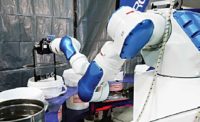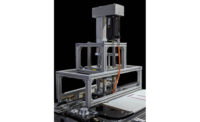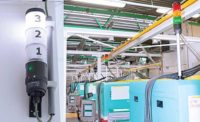Manufacturers are under pressure to reduce their overall energy consumption, improve sustainability and save money. One way to achieve these goals is by monitoring air consumption in their machines’ pneumatic systems. Doing so lowers the risk of leaks, prevents premature component wear, and reduces maintenance costs and downtime.
Bosch Siemens Hausgeräte GmbH (BSH Home Appliances Corp.) recently obtained these benefits at one of its plants by implementing a pneumatic-monitoring system with three products made by Emerson. Part of the Bosch Group, BSH is one of the largest home appliance manufacturers in Europe.
Some time ago, company management decided it needed to record the compressed air consumption on one vacuum cleaner production line. BSH sought to monitor any deviations in energy to detect possible leaks and better understand how each component consumed energy.
Equipment-wise, BSH had several criteria in mind for the monitoring system. It had to use standard filters, regulators and lubricators (FRLs), and feature communications interfaces that easily integrate into the company’s network, analytics dashboards and enterprise resource planning software. The monitoring system also had to be user-friendly and easy to manage.
To develop the right system, BSH met with automation-technology experts at Emerson. They customized a plug-and-play Industrial Internet of Things system that includes an Aventics Smart Pneumatics Monitor (SPM), Series AS FRLs, and AV03 and AV05 modular valves.
The SPM module is an edge-computing device that constantly gathers information on the status of the pneumatic system. Its Node-RED input blocks provide information from the valve system and signals from connected sensors.
By providing data analysis independent of the machine’s PLC, the module minimizes the risk of machine downtime and lowers operating costs. BSH especially likes that the SPM integrates into its network and features open-source software, which is a flow-based development tool for visual programming.
Another benefit of the SPM module is it allows engineers to record, process and forward data without having to write a single line of code. The AS series of air preparation units easily integrate with the SPM and ensure high-quality compressed air.
Both the AV03 and AV05 modular valves have a built-in connection to the SPM. The advanced-technology valves are lightweight and compact, and designed to cut energy consumption by up to 80 percent in complex-automation-machine applications.
Since installing the pneumatic-monitoring system, BSH has optimized its compressed air consumption and lowered plant carbon emissions on the vacuum cleaner line. The critical energy data continuously obtained by the system enables the manufacturer to prevent energy loss by immediately identifying any deviations or fluctuations in air pressure or volume.
“[Systems] like these are steps to meet our environmental goals,” says Werner Schlembach, head of blower production at BSH. “[Now] we can monitor our energy consumption online and come to climate-neutral production lines.”
Schlembach adds that the company hopes to achieve carbon-neutral production by the end 2020, and then implement smart pneumatics at its 40 or so other factories worldwide.
To learn more about smart pneumatic monitoring systems, call 888-889-9170 or visit www.emerson.com.








